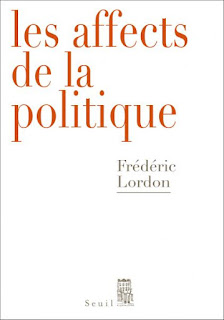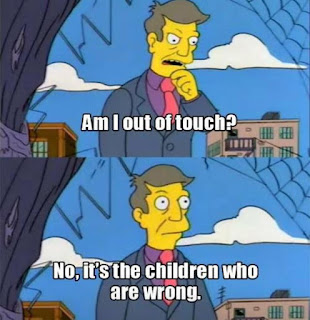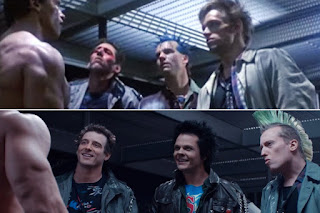That Hitchcock's Vertigo has been imitated multiple times is not surprising, but it is slightly curious that the same tree appears in two other films. The original scene takes place as Scottie Ferguson (Jimmy Stewart) takes Madeline (Kim Novak) to the redwoods. It is a fiction within a fiction, we later learn that it is actually Judy imitating Madeleine who, at the moment, is channeling Carlotta Valdez a woman who lived decades prior. The lines on the tree make it possible for Madeleine to present a life that began before her life. The lines in its bark is a memory before memory. The tree stands as a mute witness to a life that has passed before. It is a living fossil of a life not lived.
Wednesday, April 05, 2017
Tuesday, March 07, 2017
Sidekick No More: Horkheimer on Work
In Max Horkheimer's critically underrated (and out of print) Dawn and Decline we find the following aphorism:
Monday, February 27, 2017
"You'd be a Beast": Get Out and Race
As most people reading this already know, the central story of Get Out begins when Rose Armitage (Allison Williams) brings her boyfriend Chris Washington (Daniel Kaluuya) home to meet her parents. What begins as a racial comedy of manners, a satire of well intentioned liberalism, quickly descends into horror, but the question is what kind of horror? what is the dark secret waiting for Chris? The question of narrative is inseparable from the theme of the film. What kind of horror movie it is cannot be separated from what horror of racism it will depict.
Thursday, February 09, 2017
Undercover Worker: Workers Inquiry after the End of the Working Class
An afternoon reading in San Francisco
If it is possible to learn one thing from the various invocations of the "white working class" that were summoned after the election of Trump, the more the term is invoked, the less one actually knows about work, class, and race. The "white working class" exists as a kind of hobgoblin of bourgeois conscience, as a creature both hated and pitied, the racist who cannot help being one. It appears in a few soundbites and pull quotes gathered by journalists and a few stock photos of construction and factories. Against this spectacle of the working class, a hardhat and a few stereotypes about attitudes, there stands the tradition of workers' inquiry, the examination of the conditions, perspectives, trials and tribulations of the working class.
Thursday, January 26, 2017
War is Truth: 1984 is Back
Several stories have reported that 1984 is being read, or at least bought, again, becoming an unlikely best seller. This is ambiguous news at best. The book is sophomoric enough to deserve its place on every high school's sophomore's reading list. Its politics are dubious, and its philosophy is even worse, its picture of a totalitarian society based on hate and universal deception always seemed more of something to reassure members of liberal capitalist society that everything was alright in their society than a warning. There is thus something amusing about this particular chicken coming home to roost, of cold war ideology become the basis, however, impoverished of a critique of ideology.
Thursday, January 12, 2017
The Limited Efficacy of Facts Insofar as They are Facts: A Spinozist Reflection on Fake News
Nothing could be more foolish, further from the letter and spirit of Spinoza's writing than to proclaim that a given proposition is the most important. Spinoza's thought is in the movement and relation of the different propositions, axioms, and definitions, not this or that proposition. His thought is systematic, not aphoristic, which is why his thought does not lend itself to tweets, memes, or bumperstickers. However, there is one particular proposition which remains a personal favorite. It is Proposition One of Part Four, "Nothing positive which a false idea has is removed by the presence of the true insofar as it is true." This idea always seemed important to me in that it offers a corrective to the spontaneous philosophy of philosophers, the idea that true ideas and well reasoned arguments have a force in and of themselves.
Tuesday, January 03, 2017
Affective Normalization: Between Lordon and Trump
Trump's election was met with an insistent demand on the part of those who opposed him, a demand not to "normalize" his election and his presidency. The use of this term "normalize" is curious and telling. The word is not legitimize, although one could argue that the debates about the Electoral College and the popular vote, were in some sense debates about the nature, and limits, of democratic legitimacy. Or, more to the point, the legitimacy of what counts as democratic legitimacy in the US. The word "normalize" suggests something different, something broader and more inchoate than legimitacy, less a matter of constitutional checks and balances than a prevailing sentiment or structure of feeling. In some sense the slogan draws off of the existing opposition to Trump, the inability of many to see him as anything other than a crude narcissist more befitting the world of reality TV than Realpolitik, and demanding to extend the protests and jokes into opposition. It is a politics of a affect, the attempt to make a prevailing sensibility into a politics.
Tuesday, December 27, 2016
The Kids are Alt-Right: On Green Room
The problem with thinking in terms of best movies of the year is not only that it imposes an arbitrary dividing line, a line made more complicated by the uneven temporality of releases, but that it ties the calendar of films to other events on the calendar. Case in point Jeremy Saulnier's Green Room, last spring or summer its punks versus neo-nazis would have seemed like an entertaining and necessary point of conflict. Once you decide that your protagonists are a punk band nazi skinheads follow as the necessary antagonist. It is part of the natural order, like cats and dogs or aliens and predators. Who else would punks fight, hippies?
Monday, December 05, 2016
You Incomplete Me: Marx and Hegel in Balibar’s Des Universels
Requisite wine stain
“What Hegel calls consciousness, or, more to the point, consciousness of
the universal, Marx calls "ideology." It is the same thing, and yet
this change of denomination, like the deus sive natura of Spinoza (conscienta
sive ideologia, I propose), carries with it the possibility of saying something
new, or bringing it to the foreground. And at the center of debate is the part of
unconsciousness constantly rejected by Hegel at the limits of the
phenomological field”Etienne Balibar
I have early noted an increasing
turn to Hegel in Balibar’s writing both here in this blog and in an essay that
will be published here. The recently published Des Universels completes this turn, while also making it clear that
as much as Balibar often lists Hegel as a transindividual thinker, his interest
in Hegel has less to do that particular problem than with the problem of universals.
Spinoza might be the preferred thinker of the transindividuality for Balibar,
but Hegel is the thinker of the universal.
Wednesday, November 23, 2016
Prophets of Rage: Affect and Elections
Since the election of Trump there seems to be a consensus that his surprising victory stemmed from anger and frustration on the part of the electorate. The only question that follows in most analysis is what is the nature of anger. Is it classed based, frustration at globalization the loss of industrial jobs, and a recovery that seems to have only benefited the elite? Or is it race based, anger at changing demographics and a steady decline of the wages of whiteness? Of course most answer that it is in some sense both, either through the mythic "white working class," which merges race and class in a handy formula or, in a more sophisticated way, arguing that Trump always framed class in racist terms, economic uncertainty became immigrants and globalization become China.
Saturday, November 12, 2016
Nexus Rerum: Spinoza and Marx (again)
I did not really have an image for this post,
so I thought I would just plug the Spanish translation of my first book.
This a paper I wrote awhile ago. I never posted it, but thought I would now because a) I am working on some of the same problems now and b) I have no time for blogging now. b is basically an effect of a.
“…in the postindustrial age the Spinozan critique of representation of capitalist power corresponds more to the truth than does the analysis of political economy.”
-Antonio Negri
The encounter of Spinoza and Marx is arguably one of the most productive encounters in contemporary philosophy. This encounter has several origins and multiple trajectories, its most recent wave begins with the works of Alexandre Matheron, Gilles Deleuze, and Louis Althusser, continuing into multiple waves, across different variants of Marxism and Spinozism. This encounter is not, as is often the case of the dominant forms of philosophical writing and research, a matter of discerning the influences that descend from one to the other, or the arguments that would divide them. It is rather an articulation of their fundamental points of intersection, points that are not simply given but must be produced by a practice of philosophy.
Saturday, October 08, 2016
Philosophy at Work: A Few Notes on Agamben
In Agamben's The Use of Bodies we find the following passage:
The anthropology that we have inherited from classical philosophy is modeled on the free man. Aristotle developed his idea of the human being starting from the paradigm of the free man, even if this latter implies the slave as his condition of possibility. One can imagine that he could have developed an entirely other anthropology of he had taken account of the slave (whose "humanity" he never intended to negate). This means that, in Western culture, the slave is something like the repressed. The reemergence of the figure of the slave in the modern worker thus appears, according to the Freudian scheme as a return of the repressed in a pathological form.
Sunday, September 25, 2016
SignsTaken For Desires: Capitalism and Representation
Illustration of The Penal Colony
In the recently published Dans la Disruption Bernard Stiegler writes,
"An epoch is always a specific configuration of libidinal economy around which is constitute as an ensemble of tertiary retentions (that is to say technical support of collective retentions) formed by their apparatus a new technical system which is also a retentional apparatus."
Friday, September 02, 2016
The Western In Reverse: On Hell or High Water
Gilles Deleuze writes of the western “…the American cinema constantly shoots and re-shoots a single fundamental film, which is the birth of a nation-civilization…” Placed in the terminology of a different philosopher, we could say that this "birth" is the moment where the Repressive State Apparatus, or violence, is supplemented and supplanted by the order of ideology, by the Ideological State Apparatuses. Such philosophical embellishments do not tell us anything new. That the Western is about the transformation from violence to order is on the same interpretive register as the common wisdom that the monster of the horror film stands in for some actually existing horror; it is so integral to the genre it is barely an interpretation at all. Everyone knows that "When the legend becomes fact, print the legend" and that the gunslinger must, at the end ride off into the sunset, because the world he has created, a world of law and order, has no place for the violence that is its midwife.
Monday, August 08, 2016
Ideology Interpellates Subjects as Individuals: on Dean's Crowds and Party
Image from The Crowd, King Vidor
Jodi Dean's Crowds and Party can be understood to have two objects, each identified by the words in its title. First, it is an argument against the individual, the individual form, arguing that the individual is the kernel of contemporary of contemporary ideology, resurfacing even in those practices that would escape it. Second, it is an argument for the party, for a revival of the party form. The party is Dean's answer to the question that runs through several of Verso's books this fall, how to reproduce, sustain, and maximize the occupations and protests that have become part of social space. Dean's party then takes its place alongside Clover's commune and Jameson's universal army of dual power.
Thursday, July 28, 2016
A Point of Heresy: Balibar on Foucault
In a remarkable interview published in 2012, but which I happened to discover recently, Balibar credits Foucault for the concept of what he calls a "point of heresy." He defines the concept, or rather practice as follows, drawing points of intersection, or perhaps heresy, between it, Althusser's symptomatic reading, and Derrida's deconstruction as practices of reading.
Wednesday, July 13, 2016
The Modality of Necessity: On Clover's Riot. Strike. Riot
The reference in the title Riot. Strike. Riot will be abundantly clear to readers of Marx. It is reference to the formulas that open volume one of Capital, C-M-C and more importantly M-C-M' or Money. Commodity. Money Prime. It is the latter which provides the book's structuring formulation, even if it is more interested in Volume Three than One, in value theory, specifically the tendency of the rate of profit to fall as the latter has become the general ether from which to grab the present in the works of Endnotes and Theorie Communiste.
Wednesday, July 06, 2016
Reading Deleuze and Guattari as Marxist/Spinozists: On Guillaume Sibertin-Blanc's State and Politics
Guillaume Sibertin-Blanc's Politique et État chez Deleuze et Guattari: Essai sur le matérialism historico-machinic has been translated into English as State and Politics: Deleuze and Guattari on Marx. In the past twenty years since I first discovered Deleuze and Guattri I have gone from avidly reading everything that came out on them to barely ever picking up a book on Deleuze. At first the number of books on Deleuze was a slow trickle, but as the trickle gave way to a gusher of canonization, I have become much more selective, even falling behind on some of the better books. I have a longer review of Sibertin-Blanc's book coming out with Historical Materialism, but I thought that I would post one of my responses to the book in order to mark its translation, just to suggest that it is definitely not one to skip.
Friday, July 01, 2016
Kingdom within Kingdoms: Anthropological Turns in/to Spinoza
One could describe the trajectory of Marxist/Spinozism in the twentieth century as a trajectory that passes from epistemology through ontology to anthropology. With Althusser the focus was on the break between the first and second kind of knowledge, with the passage from ideological imagination to adequate scientific knowledge. As much as Althusser introduced immanent causality to Marxism it was primarily an epistemological matter, of grasping the cause in and through its various effects. Negri turned to ontology, or as he often put it, metaphysics, understanding immanence as the immanence of potentia, of power. The autonomist hypothesis becomes not just a way to make sense of capital, but all of reality. Everywhere Potestas, God's power or transcendence is asserted, we must find potentia, the immanent power of social relations and the human imagination. The last, and most recent turn, found in the works of Lordon, Citton, and, in a certain sense, Jaquet could be called "anthropological." The focus is less on the problem of inadequate and adequate ideas, understood as the problem of ideology, or the self organization of power, but on desire, affects, and imagination.
Thursday, June 09, 2016
We Get Vacations? On The Americans
When I first wrote about The Americans I saw its premise as yet another variant on the sociopathic anti-hero that has become the mainstay of popular culture. The lies and deception seemed no different than the double lives of drug dealers, serial killers, or adulterous ad men. However, I now think that I was wrong about this, or at least the show had moved in that direction. It has the same deceptions, murders, and betrayals that make up the rogues gallery of prestige television, but unlike many of the shows that it is compared to, Elizabeth and Philip feel the effects of what they have done. The do not, like Walter White, Don Draper, and others, float above it all. They feel and struggle with every loss, with every life destroyed.
Friday, June 03, 2016
Our Thoughts Are With Capital: Strategy as Subjection
Image from George Souvlis' Facebook
Eduardo Viveiros de Castro's Cannibal Metaphysics has, as one of its many charms, one of the best polemical lines of recent memory. I am referring to the following:"Even if capital does not always act with reason,
one nonetheless gets the impression that reason always delights in letting
itself be roughly be taken by capital.”
Monday, May 16, 2016
Special Guest Post: Bill Haver on The Politics of Transindividuality
Back in the days when people actually read blogs I used to get requests for guest posts, some bad, some good--all of which I declined. My response to the good ones was always "you should start a blog with that," to the bad ones I just replied, "get your own damn blog." Now I just get weird spambot requests that have keyed in on my use of the terms "unemployed," "debt," and, in a post about Breaking Bad, "rental storage units," keywords for an age of austerity. Anyway I am making an exception to the longstanding, and now irrelevant rule, to post Bill Haver's response to my recently published book, The Politics of Transindividuality. Bill Haver was my professor and dissertation director back at SUNY Binghamton, and, to be quite honest, the only reason I stayed in graduate school (I know, damned by faint praise). He is just an amazing teacher and person. As the text below will hopefully, demonstrate, Bill is the most generous and perceptive reader of texts that I have ever known, the person who can most succinctly and perceptively understand what is at stake, and examine the limits of a text.
I post this here as both a shameless act of self-promotion and promotion of Bill's work. His introduction to Ontology of Production (as well as the essays by Nishida he translated) should be required reading.
Thursday, May 12, 2016
It is the Symbolism, Stupid: Trump and Sanders
There is a certain similarity in criticism of Sanders and Trump. I am not referring to the symmetry posited by pundits of the radical center for who every left has an equal and opposite right--the tea party and Occupy Wall Street, Fox News and CNN, Iron Man and Captain America, but to a criticism offered by those far from the radical center that argue that Trump and Sanders are not the outside of the existing political spectrum. Trump's supposedly outlandish promises to deport millions of undocumented workers is not that different from existing policy. Sander's socialism is just what a previous generation would have called a new deal democrat, or what the rest of the world calls "center-left".
Friday, May 06, 2016
The Collateral Damage of the Summer Blockbuster: Or, An Introduction to Civil War
At this point the observation that the contemporary superhero film is an allegory for the war on terror, like pointing out that Godzilla is about fears of the atomic bomb or that Invasion of the Body Snatchers is about communism and conformity, that has become at this point so commonplace that it barely merits interest. What is interesting, however, is the way in which in the fifteen or so years of the cultural forms dominance it has progressed with our changing anxieties about the war. At the beginning the films were all about preventing some kind of apocalyptic attack, usually on New York City, functioning as a kind of wish fulfillment of the most immediate sort. As the war on terror has dragged on, different elements of this long war have filtered into the superhero film like the way the sound of an alarm becomes part of a dream, or, to complete the Freud reference, smoke from a smoldering bed sheet. The different subplots and themes of the film read like a list of headlines about the long war, everything from post traumatic stress to drones has been addressed in inverted superhero form.
Wednesday, April 13, 2016
Necessity Passing As Contingency (and Vice Versa): On the Spinozist Distinction of the Economic and Political
Lordon speaking as part of the "Nuit Debout" protests to France's Labor Law
Earlier, when writing a brief blog review of Lordon's Imperium, I argued that what the book lacked was any account of the relationship between the economy and politics of affects, that Lordon had simply continued to think of politics, and political belonging, from the perspective of affects without considering the relation between politics and economics.
Thursday, April 07, 2016
The Work Image: Montage in Better Call Saul and Breaking Bad
Gilles Deleuze stated that montage is an "indirect image of time," in Vince Gilligan's Breaking Bad and Better Call Saul it is an indirect image of work, or of a temporality dominated by work. I am primarily interested in the latter show, having blogged enough about the first. I just wanted to note that it is one of the stylistic points of continuity between the two shows; that and the odd close up and point of view shots. As much as the basic form remains the same the shifting tone and content of the two shows, from drug empire to the world of law firms, shifts the way the montages function, becoming less about the fantasy of accumulation and more about the particular frustrations and hopes of work.
Monday, March 14, 2016
Hobbes Versus Spinoza: This Time It's Anthropological
This morning I received an email that had the following sentence in it: "A demographic note for this week is that we have almost three times as many applicants to online programs as we did this time last year, confirming a trend we are all aware of --- that students want online degree offerings." Maybe it was the lack of coffee, or the fact that I was woken up in the night by a barfing dog (don't worry, Bento is fine. He just eats garbage sometimes), but I thought for a minute about responding to this email, pointing out that the premise did not support the conclusion. There are multiple reasons why people take online classes. They are ways of dealing with jobs that demand increased flexibility from employees, ways of finishing school around the demands of families and work. Negotiating these demands is not the same as wanting something, as desiring it or choosing it.
Wednesday, March 09, 2016
The Power of the False: On Fargo
Fargo opens with a claim that the story the film tells is based on a true story. As is well know by anyone who has looked into the story this claim is a lie. What is less remarked upon, however, is the way in which much of the film is structured around a series of lies. These lies move beyond the ordinary deceptions to become part of what Deleuze calls "the power of the false."
Thursday, February 11, 2016
Be Social: Fischbach's Le Sense du Social
Franck Fischbach's Le Sens du Social: Les Puissances de la Coopération continues two of the threads of his recent writings. First, there is an examination of the "socio-political" as an orientation for political philosophy. This is directly opposed to the "ethico-political" in that the former places political economy, or specifically the division of labor at the center, rather than subjectivity or alterity. Second, there is an increasing turn away from Spinoza as a philosopher or theorist of the social and the political and towards Hegel and the return to Hegel in contemporary critical theory. (You can probably guess that I am for the latter and against the former, but such a "hot or not" list says little about why--or what is at stake).
Monday, February 01, 2016
Trumped: The Ecology of Attention and Affects
Pitch for a sequel to They Live. The "ghouls" (as they are referred to in the script), or aliens, have been unmasked by Nada's (Roddy Piper) destruction of the signal in the first film. Some are hunted down, while it is rumored that others have gone into hiding, finding new ways to disguise their horrifying appearance and devious plans. The destruction of the ghouls does very little to change things, the wealthy still dominate and the poor still suffer. Then one day a ghoul emerges that does not conceal his appearance, or his intentions. He makes it clear that he plans to continue accumulating massive wealth. When people point out that his kind exploited and depleted the planet he freely admits it, pointing out that running a inter-dimensional conglomerate is no small task. It was a huge and impressive endeavor. As much as one might be critical of the ghoul's exploitation of the planet, no one can doubt that they got things done. This ghoul then states that he is running for president. Critics declare that he is a ghoul, but he makes no secret of it. No one can unmask him, for he is already unmasked; attempts to reveal his sinister motives are belied by his willingness to state them clearly. The ghoul eventually wins, and once again the country is under their thrall, only now openly so.
Monday, January 11, 2016
Mythocracy II: This Time It's Personal
No one has yet to determine what a story can do. Some are
offended by the “myths” that obscure;
others denounce “the histories” that we recount; others still believe in
that it is enough to find the good story that would lead the donkeys to polls,
the sheep to the market, and the ants to their work. More than these
denunciations or formulas, this book proposes an interrogation of the power of
stories, doubled by a narrative on the mythic nature of power: mythocracy.
Tuesday, December 29, 2015
L'Etat C'est Nous: Lordon on the Politics of Affects
After having published a book on the economic dimension of affects, followed by a book on the social nature of affects, it makes sense that Frédéric Lordon would write a book on the politics of affect. However, Imperium: Structures et affects des corps politiques is less about the classic questions of autonomy and determination, the relation of politics to economics, etc, than it is about how the affects redefine the very ground of the what is thought of as politics.
Thursday, December 03, 2015
Not Even Gun Control Will Save Us Now: Notes on the Psycho-Sociology of Mass Killing
The events are both all too familiar, all too common, a mass shooting at some university, school, or public place, but at the same time they are each singular, a different person, a different town. (War might be the way history teaches Americans geography, but mass shootings are the domestic version. Columbine, Sandy Hook, and Aurora, these are towns that are known for the horrors that have happened there). Always the seemingly interminable wait for the ethnicity and motives to be revealed. It takes only hours, but it is interminable because it determines the political fallout, will it be called terrorism, or will it fade into the generic terror of day to day life in America. The singularity of the events, of the different motives or malady determining the actions, would seem to preclude any general theory. Yet, the very fact that they have become so familiar, defining a particular phenomena of modern life, demands theorization.
Saturday, October 17, 2015
Affective Reproduction: Thinking Transindividuality in an Age of Individualism
Paper Presented at the Affect Theory Conference
One of the many theoretical and practical promises of the so-called “affective turn” in social and political thought is that it makes it possible to conceptualize the social and political dimensions of the most intimate aspects of experience. Or, put differently, it makes it possible to think of the way in which political and economic structures can only exist, can only reproduce themselves, if they do so at the level of affects and desire. The reconceptualization that I am referring to here is not to be confused with a reduction of the individual to the mere effects of structural conditions and relations, in which individuals become simply bearers of economic and political functions, nor is it a reduction of politics and economics to individual experiences and intentions, a kind of intimate theatre of micro-politics that never becomes macro. It is a matter of thinking the mutual implication of the individual and the collective, or in a word, transindividuality.
Saturday, October 03, 2015
What the Shopkeeper Knows: Reading Contemporary Capitalism
Whilst in ordinary life every shopkeeper is very well able to distinguish between what somebody professes to be and what he really is, our historians have not yet won even this trivial insight. They take every epoch at its word and believe that everything it says imagines about itself is true.
--Marx and Engels, The German Ideology
One of the persistent themes in Peter Fleming's The Mythology of Work: How Capitalism Persists Despite Itself is a critique of Lordon's Willing Slaves of Capital. What is criticized is not the particular synthesis of Marx and Spinoza, but how Lordon reads management literature. Fleming criticizes Lordon for taking management discourse at its word, for seeing motivation and the various demands to "love one's job" as something other than smokescreens for a strategy of fear and anxiety.
Tuesday, September 22, 2015
Genysis of a New Film Form: Reflections after Watching Several Hollywood Films on a Long Flight
Top: Terminator, Bottom Terminator Genysis
The repetition that defines Hollywood is not without its difference. It constantly mutates in response to new conditions. This transformation has gone from the sequel to the prequel, from the remake to the reboot. Following this summer's Mad Max: Fury Road, Jurassic World, and Terminator Genysis it is possible to chart yet another mutation, not a remake or a reboot but a "callback."
Thursday, September 17, 2015
Conceptually Barking Dogs: Between Spinoza and the Frankfurt School
This post will be illustrated by pictures of my
dog, Bento. *
(This picture was not staged. He stole this book)
"The concept of the dog doesn't bark" --Spinoza
Idit Dobbs-Weinstein's Spinoza's Critique of Religion and its Heirs: Marx, Benjamin, and Adorno is a book that challenges many commonly held conceptions. The first is in the title itself, which suggests a strong relation where many, myself included saw at best a non-relation and at worst a repudiation of Spinoza by the Frankfurt School. Spinoza often appears less as a precursor for the Frankfurt School than as part of what the latter consider to be the dark side of the Enlightenment. I am thinking specifically of the passage of the Dialectic of the Enlightenment which states, "Spinoza's proposition: 'the endeavor of preserving oneself is the first and only basis of virtue," contains the true maxim of all Western civilization, in which the religious and philosophical differences of the bourgeoisie are laid to rest." It is thus somewhat surprising to see Dobbs-Weinstein recast a line of descent moving from Spinoza through Marx to Benjamin and Adorno. This reordering of the various philosophical precursors follows Dobbs-Weinstein's argument larger argument for the repressed materialist (islamic and judaic) Aristoltean tradition.
Tuesday, August 18, 2015
Liminal For Life: On It Follows
At first glance it is possible to consider It Follows to be a kind of meta-horror, a film which makes the rules of the genre explicit to the narrative itself. In this case the rule in question would be the one in which sex is instantly followed by death in slasher films. The sex/death connection becomes the film's central mythos, and only explanation for the "it." However, It Follows is not a knowing wink at the horror genre, as in the case of the Scream films, nor is it a film like Cabin in the Woods, which explains genre conventions by displacing them into another genre.
Wednesday, August 05, 2015
Coming Soon: The Politics of Transindividuality
I have not had much time for blogging as of late as I complete the finishing touches, indexing, proofreading, etc., of The Politics of Transindividuality.
Sunday, June 21, 2015
The Stories We Tell: Event and Mythocracy
Thursday, June 11, 2015
Naturally Historical: On Paolo Virno's When the Word Becomes Flesh and Déjà Vu and the End of History
Paolo Virno's philosophical trajectory is an interesting and strange one. He first became known to the English speaking world through The Grammar of the Multitude. This book's particular grammar, or rather vocabulary, defines the central terms of post-autonomist thought, multitude, general intellect, Post-Fordism, etc., in a somewhat idiosyncratic manner. Marx and Spinoza are cited, but so are Aristotle, Sohn-Rethel, Heidegger, and Simondon. Virno has been drawn as much to the philosophical presuppositions and effect of these terms, of this new grammar, than to their economic basis or political implications.
Thursday, May 21, 2015
Tales of Post-Apocalyptic Madness: On Subjectivity and Society in Mad Max
Mad Max perhaps invented the reboot. One of the most interesting things about the Mad Max films is the way in which the backstory has changed from film to film. Nuclear war is not even mentioned in the introductory voice over of The Road Warrior only to be included in the backstory of Mad Max Beyond Thunderdome. Mad Max: Fury Road changes the backstory as well, adding "the water wars," to the blood and fire that have made the apocalypse. It is possible to argue that each film reflects changing nature of apocalyptic fears, from gasoline shortages, to nuclear war, and finally to dwindling water supplies. We get the apocalypse we fear.
Tuesday, May 05, 2015
First Time as Tragedy, Second Time as Tragicomedy: On Better Call Saul
"Spinoff! Is there any word more thrilling to the human soul?" Troy McClure, The Simpsons
Better Call Saul confronts a series of hurdles in its first season. The first has to do with the low success rate of its specific lineage. Spinoffs have long been considered the lowest form of television entertainment. A position perhaps now occupied by reality shows, or, to be more precise spinoffs of reality shows. Better Call Saul stacks the odds against itself by combining the lowest form of television entertainment, the spinoff, with the lowest form of film, the prequel. While the spinoff is hated for its derivative nature prequels are not only derivative but deprived of at least the modicum of narrative uncertainty that would compel one to follow a plot. While viewers of Breaking Bad could be relatively certain that things would end badly for Walter White, there was at least the question of how he would meet his doom--cancer, Mexican Cartels, Hank Schrader, Jesse? Finding out how was half the fun. We know exactly how things will end for Saul Goodman.
Thursday, April 09, 2015
From Desiring Production to Producing Desire: Between Anti-Oedipus and Lordon
Art by Fernando Vicente
Upon rereading and teaching Lordon's Capitalisme, Désir, et Servitude (or, as it is called in English, Willing Slaves of Capital) I was struck by certain productive similarities between the book and Deleuze and Guattari's Anti-Oedipus. These similarities are not of influence; Lordon is much more influenced by recent Spinozist thinkers such as Bove and Sévérac (even embracing the latter's critique of Deleuze) than he is by Deleuze's reading. Nor are the similarities of a shared point of reference, despite Deleuze and Guattari's invocation of Spinoza in the opening pages Anti-Oedipus is not a very Spinozist book. Rather the connection is one of a shared problem, or, more to the point it brings out particular elements of Deleuze and Guattari's book obscured by the '68 reading (what a crazy book!) or the more current, accelerationist interpretation.
Monday, March 16, 2015
Exceptions that Prove Rules: Lordon and Jaquet on Reproduction
The Working Class Goes to Heaven
Years ago, during my final year of graduate school, I taught a class at SUNY Cortland called "Race, Class, and Gender," or something to that effect. It was a required course meant to teach kids from Long Island and upstate New York about the reality of racial domination, capitalist exploitation, and sexist oppression. One student who hated the class turned in a paper that was just a list of names, everyone from Oprah Winfrey to Ellen Degeneres; her point was that this list, a list of prominent African Americans, women, and gays and lesbians, proved that racism, sexism, and class did not exist. It was not even a paper, just a list, but it reflects a way of thinking that is all too common. Anecdotal exceptions negate the reality of structures of domination and marginalization.
Sunday, March 01, 2015
America: Love it or Hate it (Or, on emotional reductionism and the Politics of Affect)
I tried to avoid commenting on current events in this blog, blockbuster films, new books, new television shows, but not current events. However, Giuliani's recent remarks about Obama are only interesting to me because the seem to be another event in a general trajectory of what I would call, for lack of a better term, emotional reductionism. Emotional reductionism is the insistence that the only meaningful political distinctions are emotional ones, and those emotional distinctions boil down to love and hate. I can think of quite a few instances of this in recent years, they "hate us for our freedoms," they love death, etc. Politics has become an affair of love or hate.
Monday, February 16, 2015
Put a Drone on It: Chamayou's A Theory of the Drone
Image from Sleep Dealer
Drones are having their cultural moment right now. They have appeared in such films from Interstellar to Captain America: Winter Soldier. While in the first film the drone's cameo appearance was used to shuffle in some post-Empire concerns (the drone was an Indian Surveillance drone), in the latter film drones do not directly appear but the the film deals with "drone anxiety." Drone anxiety is the fear that the very things that make drones strategically desirable--"precision targeting," low risk, and stealth, will make possible a massive centralization and automation of state power. (Sleep Dealer, pictured above, was ahead of the curve on this point). The unmanned ariel vehicle becomes synonymous with a breakdown of responsibility and centralization of control. In many cases the fear of the drone then just merges with fears of robots. In any case drones are hot, and the war on terror is not (or at least less so).
Saturday, January 31, 2015
Screening Infra-Ideology: On American Sniper
American Sniper: Starring Bradley Cooper and a really fake baby
It seems wrong to call American Sniper ideological in the traditional sense of the word. Racist yes, but ideological no. It only pays the most facile lip service to anything like a justification for the war in Iraq, "fighting them there versus fighting them here" is mentioned but hardly developed as an argument. It is perhaps best understood to function at the level of what Pierre Macherey calls "infra-ideology," ideology that functions at the level of norms, comportments and practices rather than beliefs. The point of Chris Kyle is not that he believes, or what he believes, but his physical dedication, his manliness.
Thursday, January 22, 2015
Class Structure: On Bidet's Foucault Avec Marx
For reasons that are as much historical as they are philosophical the relation between the thought of Foucault and Marx has become a topic of inquiry again. There are multiple versions of this question, from Macherey's investigations into the concept of "norms" as a central aspect of capitalist society and social relations, to questions about Foucault's interest in neoliberalism. A question that was generally considered decided in past generations has been reopened in multiple ways, running the gambit from the speculative to political. Jacques Bidet's Foucault avec Marx adds what could be considered a structural dimension to this question.
Friday, January 02, 2015
The Class Struggle at Home: Jaquet's Les Transclasses
Perhaps the best way to approach Chantal Jaquet's Les Transclasses: ou la non-reproduction is by situating it between two caricatures of intellectual positions. On the one hand, the left one, we have studies of the "reproduction of the relations of production," the work of Bourdieu most importantly, but also Althusser, that stresses how the classes endlessly reproduce themselves, or are reproduced by the institutions of schools, media, and so on. On the other hand, the right one, we have the various theories of the culture of poverty, and more importantly, various "pulled up by bootstraps" narratives, all of which stress that individual will and fortitude can overcome all socio-economic barriers. On the one hand there is a theory of the necessary reproduction of the relations of production, while on the other there is the entire anecdotal history of exceptions.
Subscribe to:
Posts (Atom)

















































